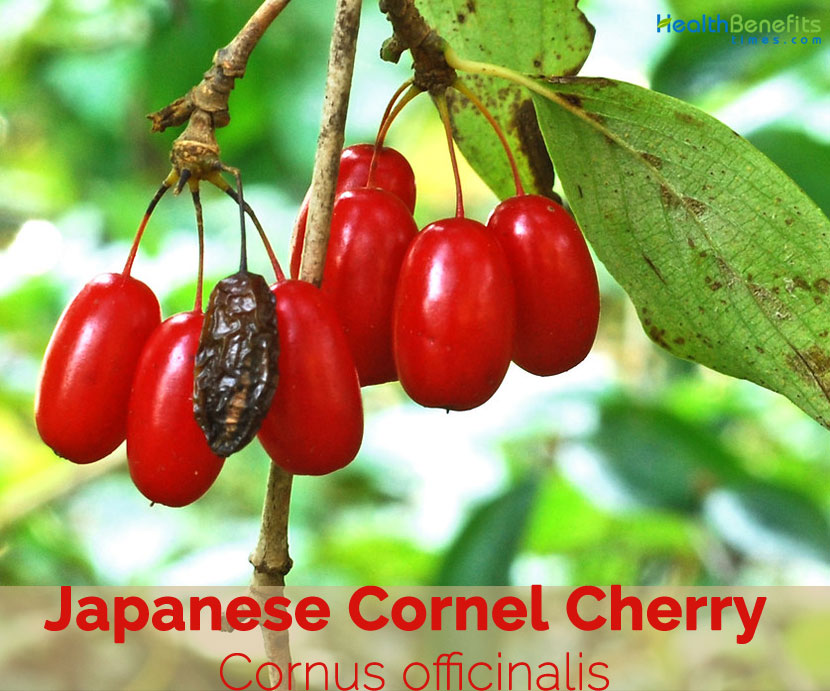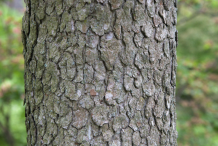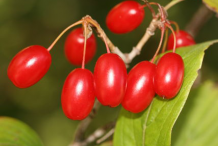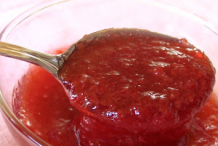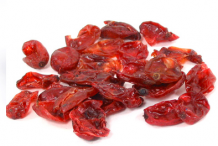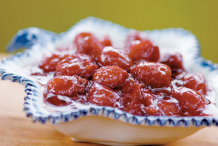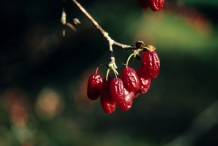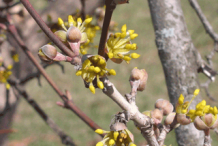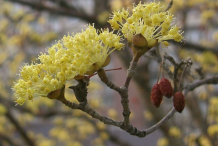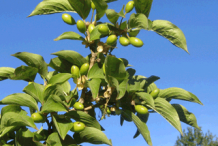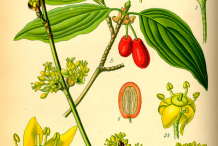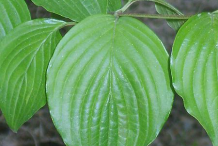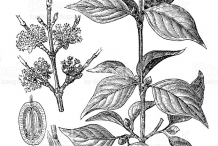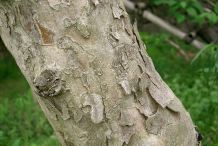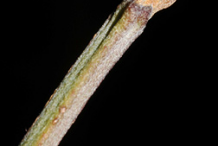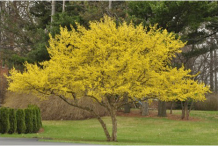Plant Description
Japanese Cornel Cherry is a medium to large deciduous shrub or small tree that grows about 5 -12 meters tall. The plant is found growing in forests, forest margins as well as mountain slopes and it prefers almost all types of garden soil including sandy, loam and clay soils. Well drained moist soil is ideal for their proper growth. It bears deep brown branches, while the twigs are Slender, glabrous, purplish red and green, turn brown the second year, pith white, leaf buds slender and pointed, flower buds much larger and round. Barks are dark gray to reddish brown, scaly, curling with exfoliating patches.
Leaves
Simple leaves are opposite; blade is oval or oblong, 5 to 7 cm long, and 3 to 4.5 cm wide, and with narrow long pointed apex, rounded or broadly cuneate base, entire margin, nearly smooth or occasionally pubescent upper side, and white hairy lower side. Petiole is about 1 cm long. The lustrous dark green leaves develop a deep plum red fall color.
Flower
Japanese Cornel Cherry trees bear small yellow flowers measuring about 5 mm to 10 mm. Each flower has four small yellow petals. These flowers appear in clusters of 10 to 25 flowers towards the end of winter much before the leaves of the new growth season appear. Flowering normally takes place from Feb to March.
Fruit
Fruit is a reddish oblong drupe measuring about 2 cm in length and 1.5 cm across. Each berry-like fruit of this plant encloses a solitary seed. The fruit ripens from June and July. They serve as food for birds or can be used for preserves. They can also be used to make a wonderful sauce, something very akin to cranberry sauce, especially when they are pitted and subsequently boiled with orange and sugar.
History
A member of the dogwood family, this fruit has been used for 7,000 years as a food crop in ancient Greece. Japanese Cornel Cherry is native to regions of Eastern Europe and Western Asia. Known mainly as an ornamental plant in the U.S., its cherry-like fruits have been part of a healthy diet in some parts of the world for thousands of years. In its native range, it is still used as a fresh fruit and is popular as a fruit drink.
With properties similar to a tart cherry, other uses include syrup, jelly, jams, and pies, wine and baked goods. This historically significant fruit has lost favor in the industrialized age because it does not lend itself well to mass production and processing. The fruit has an elongated pit that is hard to remove because it adheres tightly to the edible flesh. Fruit ripens over an extended period of time, requiring multiple harvests.
Health benefits of Japanese Cornel Cherry
Many health advantages may be derived from Japanese Cornel Cherry fruits. The dark brown or reddish brown bark of those bushy trees conjointly has some advantages to supply. Each the fruits and also the bark have astringent and febrifuge properties. Ripe little fruits are highly nutritive. Listed below are the top health benefits of using Japanese Cornel Cherry :
1. Remedy for dysentery and diarrhea
Japanese Cornel Cherry has traditionally been used to treat dysentery and diarrhea due to its strong astringent action which is the result of high tannin content. The dry mouth sensation one feels when eating quinces, persimmon, sapodilla or Japanese Cornel Cherry is caused by the astringent tannins shrinking or contracting tissues. This limits the discharge of fluids and signifies a first step towards recovery from diarrhea or dysentery.
2. Supports kidney function
According to traditional Chinese medicine, Japanese Cornel Cherry is an efficient diuretic. It means it can stimulate urine production, a process which supports normal kidney function, helps reduce high blood pressure (hypertension) and promotes detoxification.
3. Impressive antibacterial and antiviral properties
Japanese Cornel Cherry is supposed to be ideal for cold and flu prevention due to the fact that it contains high amounts of vitamin C, a potent natural anti-inflammatory, antiviral and antibacterial agent. In order for one to enjoy such health benefits, Japanese Cornel Cherry must be consumed raw (cooking heat destroys vitamin C)
4. Rich antioxidant content
Like most berries, Japanese Cornel Cherry fruit consist of generous amounts of antioxidants which offer protection against free radical damage from free radical molecules and protect against chronic disease.
5. Natural hepato-protective
Research on the properties and health benefits of Japanese Cornel Cherry has found that regular consumption of the berries improves liver function by exercising a strong hepato-protective action.
6. Excellent tonic
Japanese Cornel Cherry boast excellent restorative properties due to their high mineral content. Being rich in calcium, potassium, copper, iron, manganese, zinc and a good source of sodium, dogwood promotes recovery following illness (for example, drinking dogwood berry juice can speed recuperation after a more severe diarrhea episode).
Traditional uses and benefits of Japanese Cornel Cherry
- Fruit is an astringent causing the contraction of body muscles or tissues in case of excessive bleeding.
- It is also a febrifuge that helps in reducing the impact of fever and brings down the body temperature to normalcy.
- Bark and fruit are also nutritive and helps in restoring the lost nutrients of the body.
- Astringent property of the fruit acts as a good treatment for bowel complaints and fevers, at the same time as it is also used in the treatment of cholera.
- Flowers of Japanese Cornel Cherry are used in the treatment of diarrhea.
- Various diseases and health conditions such as aching lower back and knees, vertigo, tinnitus, spermatorrhoea, frequent urination, liver-deficiency chills and fever, persistent sweating due to deficiency, palpitations, scattered pulse, neurasthenia, menstrual disorders, and more can be taken care of by the properties of the Japanese Cornel Cherry plant.
- Drinking the juice extracted from Japanese Cornel Cherry can also promote recovery after a bout of severe diarrhea.
- Eating Japanese Cornel Cherry also promotes the functioning of the kidneys.
- Consumption of this fruit helps to promote urine production, thereby supporting the normal functioning of the kidneys.
- Japanese Cornel Cherry also aids in lowering high blood pressure and is beneficial for people suffering from hypertension.
- Moreover, this berry-like fruit also encourages detoxification of the entire body.
- It is believed that this berry-like fruit is a perfect for preventing common cold and flu, as it contains elevated levels of vitamin C, which is a very powerful natural antiviral, antibacterial and anti-inflammatory agent.
- These fruits are also employed for treating cholera.
- Traditional medical practitioners often recommend consumption of these cherries on a regular basis, because they are also considered to be antihistamine and anti-diabetic agent.
- Japanese Cornel Cherry flowers are especially good for the treatment of pain in the back and knees, dizziness, menstrual cramps and neurasthenia.
- Like all herbs that suppress bodily fluids (even excessive ones), it will simply prolong or lead to a worsening of symptoms if it is used without tonic or detoxifying herbs.
- The fruit is antibacterial, anti-fungal, hypo-tensive, anti-tumor, astringent, diuretic, hepatic and tonic.
- The fruit, without the seed, is decocted for the treatment of arthritis, fever and a wide range of other ailments.
- It is used in the treatment of senile lumbago, diabetes, cystitis, tinnitus etc.
- Fruit has an antibacterial action, inhibiting the growth of Bacillus dysenteriae and Staphylococcus.
- Stem bark is astringent, antimalarial and tonic.
- Plant is antibacterial, diuretic, hypotensive and a urinary antiseptic.
Ayurvedic Health benefits of Japanese Cornel Cherry
- Yellow Fever: Boil the inner bark of Japanese Cornel Cherry in one glass of water of 15-20 minutes. Prepare a decoction. Have it two times a day.
- Night Sweat: Take equal amounts of Rehmannia, Cornus Florida, White Peony, Yam Rhizome, Hoelen, water plantain, Anemarrhena, Phellodendron Amurense. Powder all ingredients together. Have one tsp with milk at night.
- Debility: Ginseng Korean, Polygonatum, Chinese Knotweed, Dong Quai, Schisandra, Wild yam, Chinese Liquorice, Goji berry, White Peony, Hoelen, Eucommia, Glehnia, Cornus officinalis, Citron, Paeonia Suffruticosa, Red Sage and Bupleurum in conjunction are beneficial for energy, stamina and improves overall feeling of well-being. It is the perfect daily energy supplement.(You can buy the formula containing above mentioned herbs. Capsule form is readily available. Consume 1 capsule per day.)
- Sexual Health: Morinda officinalis, Dong Quai, Eucommia, Aconitum Carmichaelii, Goji Berry, Garlic Chives, Ginseng Korean, Cinnamon, Yam Rhizome, Cornus officinalis, Cnidium, Rehmannia, Cynomorium songaricum, cuscuta Chinensis, horny goat weed in conjunction are beneficial for male and female sexual energy. It increases vitality and stamina.
- Reproductive problems of Male: Ginseng Korean, Astragalus, Dong Quai, Rehmannia, Cuscuta Chinensis, Goji berry, Fennel, Zanthoxylum Piperitum, Morinda Officinalis, Cornus officinalis, Polyporus umbellatus, Psoralea, Achyranthes Aspera, Yam Rhizome, Horny Goat weed, Eucommia, Cinnamon, Paeonia Suffruticosa, Raspberry, Chinese Knotweed, Anemarrhena, Atractylodes Macrocephala, Water Plantain, Senega, White Peony, Anemone Chinensis and honey in conjunction are beneficial for reproductive problems of Males and acts as a powerful Kidney tonic.
Culinary Uses
- Fruit consumed raw or cooked.
- Fully ripe fruit is quite pleasant but slightly astringent.
- They are used as a key ingredient for making zesty jam.
- Japanese Cornel Cherries are deseeded and cooked with sugar and orange to prepare a sauce like the cranberry.
- This fruit is used to make the alcoholic beverage raki or rakia in Albania.
- It is consumed as a snack with salt by people in Iran and Turkey during summer.
- These berries are also traditionally consumed in cold drinks in Iran and Turkey.
- If you wish you can also eat the dried Japanese Cornel Cherry fruits directly.
- People in Armenia and Azerbaijan use these fruits for distilling vodka.
- In Greece, people use Japanese Cornel Cherry berries to prepare a home-made liqueur.
- People in Iran and Turkey use the fruits to prepare a traditional cold drink locally named kizilcik serbeti.
Other Facts
- Shan Zhu Yu has been used for at least 2,000 years in Chinese herbal medicine.
- It is an herb that “stabilizes and binds” and is used principally to reduce heavy menstrual bleeding and unusually active secretions including copious sweating, excessive urine, spermatorrhoea and premature ejaculation.
- Bark of Japanese Cornel Cherry trees was used to make a red dye, which is employed to make fezzes.
- Similarly, the leaves of this plant yield tannin.
- Fruits of these plants are not cherries. They earned their name from their cherry-like appearance.
- Dense and heavy wood from these trees were used to make weapons like bows and spears during the seventh century B.C.
References:
http://www.theplantlist.org/tpl1.1/record/kew-47459
https://npgsweb.ars-grin.gov/gringlobal/taxonomydetail.aspx?id=11567
http://pfaf.org/user/Plant.aspx?LatinName=Cornus+officinalis
http://www.missouribotanicalgarden.org/PlantFinder/PlantFinderDetails.aspx?kempercode=b995
https://plants.usda.gov/core/profile?symbol=COMA21
http://www.onlyfoods.net/cornelian-cherry.html
http://www.mortonarb.org/trees-plants/tree-plant-descriptions/cornelian-cherry-dogwood
https://en.wikipedia.org/wiki/Cornus_mas
http://dendro.cnre.vt.edu/dendrology/syllabus/factsheet.cfm?ID=280
Comments
| Japanese Cornel Cherry Quick Facts | |
|---|---|
| Name: | Japanese Cornel Cherry |
| Scientific Name: | Cornus officinalis |
| Origin | South western regions of Asia and southern Europe |
| Colors | Dark ruby red or a bright yellow |
| Shapes | Oblong drupe measuring about 2 cm in length and 1.5 cm across |
| Taste | Sour Astringent |
| Health benefits | Supports kidney function, Remedy for dysentery and diarrhea and Natural hepato-protective |
| Name | Japanese Cornel Cherry |
|---|---|
| Scientific Name | Cornus officinalis |
| Native | South western regions of Asia and southern Europe. In Asia, it is found growing in Azerbaijan, Armenia, Iran, Israel, Georgia, Syria, Lebanon and Turkey. |
| Common Names | Cornelian Cherry, Cornelian Cherry Dogwood, European Cornel |
| Name in Other Languages | Chinese: Shan zhu yu (山茱萸 ) English: Asiatic dogwood, Japanese cornel, Japanese cornelian-cherry, Asian dogwood, Japanese dogwood French: Cornouiller officinal German: Japanische Kornelkirsche, Japanischer Hartriegel Japanese: Aki sango (アキサンゴ), Aki sango (秋珊瑚), Haru kogane bana (ハルコガネバナ), Haru kogane bana (春黄金花), Sanshuyu (サンシュユ), Sanshuyu no ki (サンシュユの木) Korean: Sansuyu (산수유), sansuyunamu Polish: Dereń japoński |
| Plant Growth Habit | Medium to large deciduous shrub or small tree |
| Growing Climate | Found growing in Forests, forest margins, mountain slopes |
| Soil | Grow well in almost all types of garden soil including sandy, loam and clay soils. Well drained moist soil is ideal for their proper growth |
| Plant Size | 5 -12 meters |
| Twigs | Slender, glabrous, purplish red and green, turn brown the second year, pith white, leaf buds slender and pointed, flower buds much larger and round |
| Bark | Dark gray to reddish brown, scaly, curling, exfoliating patches |
| Branches | Deep brown branches |
| Leaf | Simple leaves are opposite; blade is oval or oblong, 5 to 7cm long, and 3 to 4.5cm wide, and with narrow long pointed apex, rounded or broadly cuneate base, entire margin, |
| Flowering Periods | Feb to March |
| Flower | Small yellow flowers measuring about 5 mm to 10 mm. Each flower has four small yellow petals. These flowers appear in clusters of 10 to 25 flowers towards the end of winter |
| Fruit Shape & Size | Oblong drupe measuring about 2 cm in length and 1.5 cm across. Each berry-like fruit of this plant encloses a solitary seed. |
| Fruit Color | Dark ruby red or a bright yellow |
| Flavor/Aroma | Acidic flavor |
| Taste | Sour Astringent can be described as a mixture of sour cherry and cranberry. |
| Seed | One seed usually no more than 2 cm long. They are oblong, and blunt at both ends. |
| Plant Parts Used | Fruit, Bark |
| Varieties |
|
| Season | September |
| Health benefits |
|
| Precautions |
|
| Lifespan | 150 years in its native habitat |


